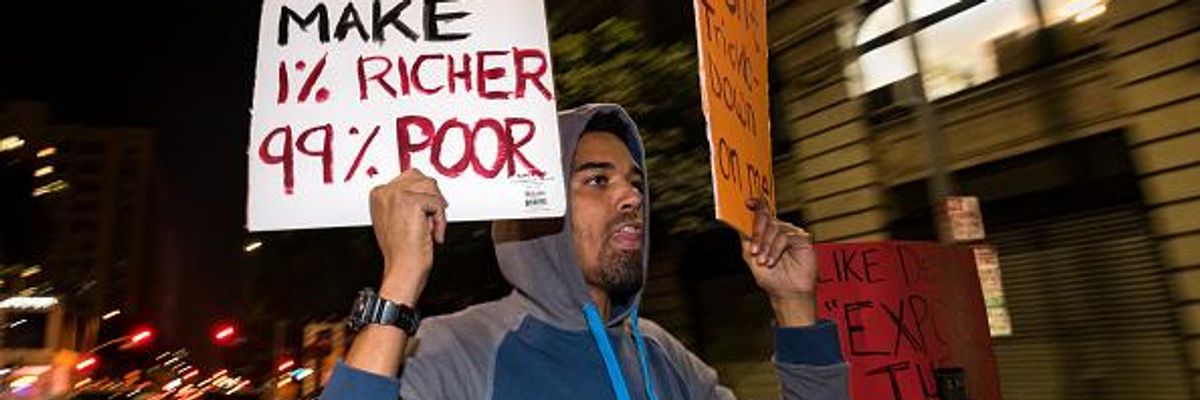As new details about President Donald Trump's years of evasive tax practices continue to come to light following the exposure earlier this week of the president's financial records, many progressives are arguing that the revelation of Trump's tax avoidance scheme--some of it legal and relatively ordinary among wealthy Americans--exposes the injustice of a tax code that enables a billionaire real estate tycoon to pay less in taxes than a teacher, nurse, and undocumented worker.
"The impunity of the billionaire class is strangling this country."
--Ryan Cooper, journalist
The tax code is the real culprit in the ongoing saga, critics say.
The New York Times' eye-opening expose of two decades worth of Trump's tax returns has unveiled damning information that the president sought to keep hidden from view, but Washington Post columnist Katrina vanden Heuvel wrote Tuesday that "what's truly shocking about the returns is what is legal, not what is illegal."
Vanden Heuvel was not alone. As Common Dreams reported on Monday, several progressive observers and legislators noted that the tax dodging behaviors revealed by the documents are all-too-common among the top 1%, who are "responsible for 70% of unpaid taxes," according to Sen. Bernie Sanders (I-Vt.)--amounting to $800 billion in avoided taxes over just three years.
"If you are a normal person who makes a wage, your tax compliance is 99%," explained Natasha Sarin, a law professor at the University of Pennsylvania. "If you are a rich person who earns dividend income and real estate income and runs a proprietorship, your compliance rate could be as low as 45%."
" Donald Trump is a liar, a cheater, and a crooked businessman, yes," Sen. Elizabeth Warren (D-Mass.) said on social media earlier this week. "But he's also taking advantage of a broken, corrupt, and unequal system that's built for people like him to do what he did."
Economist Michael Linden, executive director of the Groundwork Collaborative and a fellow at the Roosevelt Institute, tweeted earlier this week: "There's so much in these tax returns that are not just about Trump, but about how the rich have different rules."
While Trump's exploitation of glaring loopholes and corporate-friendly provisions in the U.S. tax code allowed him to reduce his federal income tax bill so thoroughly that the billionaire paid only $750 in federal income taxes in both 2016 and 2017 and not a penny in 10 of the 15 years preceding his presidential term, critics pointed out that teachers and nurses pay more in taxes.
"A teacher can't carry over losses for a decade," Linden wrote.
Yet reporting significant business losses is exactly how Trump--and others in his class--successfully reduce tax bills to avoid paying their fair share of federal income taxes, as the Times showed.
Although Trump's ongoing legal battle with the IRS over a $72.9 million dollar tax refund he took advantage of in 2010 suggests that "his various maneuvers do, in fact, exceed what is allowed by the law," as Steve Wamhoff, federal policy director at the Institute on Taxation and Economic Policy (ITEP) explained, the news about Trump's tax avoidance scheme includes plenty of evidence that the tax code caters to super-rich Americans who are well-positioned to dramatically lower the amount of money they owe to the government.
During his time in office, Trump and his Republican colleagues have passed legislation that makes the tax code even more regressive--benefitting big business to the detriment of working people.
According to journalist Dylan Matthews' calculations and in the words of vanden Heuvel, "the self-proclaimed billionaire paid less than many of the lowest-paid workers in America, many of whom are risking their lives providing essential services during the pandemic."
This includes undocumented workers, who constitute a substantial portion of essential workers in the U.S. and pay $11.7 billion annually in taxes, according to an estimate by ITEP in a 2017 report.
Sandra Diaz, one of Trump's former employees who was undocumented when she worked at his Bedminster golf course, shared a photo of her W2 on social media and wrote: "When I was an undocumented immigrant working for Trump, I paid more taxes in a month or two than he paid in a year... All my undocumented colleagues who worked for Trump paid taxes and Social Security and got no benefits."
"As an employer, Donald Trump has spent years exploiting people who are clearly more willing to play by the rules than he is," said Frank Sharry, executive director of America's Voice, an organization fighting for the rights of immigrants in the United States.
"As a politician, his brand is built on attacking immigrants as freeloaders and thieves. But clearly, Trump is projecting."
--Frank Sharry, executive director, America's Voice
"As a politician, his brand is built on attacking immigrants as freeloaders and thieves," added Sharry. "But clearly, Trump is projecting."
Writing in Vox on Monday, Emily Stewart argued that "the problem isn't just Donald Trump deducting $70,000 in haircuts from his taxes or counting his family home in Westchester County as a business expense. It's also the system that let him do it."
"We essentially have a two-tiered system in this country," the legal scholar Natasha Sarin told Vox. "If you are wealthy and have at your disposal access to resources to figure out ways to toe the line with respect to tax laws or totally evade existing liabilities, there's an infrastructure in place for you to do it."
"Even if some or much of it is legal," wrote Stewart, when individuals in an ultra-wealthy stratum can successfully devise a way to pay less in taxes than millions of U.S. households, "it feels a lot like cheating in a game that it isn't even possible for most people to play."
Economist Ernie Tedeschi showed that half of U.S. households paid more than $750 in federal income taxes in 2019, even after credits, and journalist Ryan Cooper pointed out that "the median U.S. household pays nearly three times as much in federal income tax as the sitting president did."
"American families and small businesses that have paid their taxes and played by the rules are struggling to stay afloat," Warren tweeted on Tuesday. "Meanwhile, 'rich' and powerful guys like Donald Trump hire tax wizards to make their tax bills disappear."
And "it's incredibly hard for the IRS to go after" the wealthy, Sarin explained.
As ProPublica reported in 2018, a person making $20,000 annually is more likely to be audited than someone making $400,000 per year. And data from the Center on Budget and Policy Priorities shows that IRS resources for enforcement have been seriously diminished since 2010, which has prompted calls to "re-fund the tax police."
"It's kind of depressing that this is the world we live in and that the president of the United States thinks it is okay that he pays less taxes than the poorest people in the country," Sarin told Vox. "Even if that is what the tax code allows him to do legally, which it definitely does not, this is a fairly stunning indictment of him and of a tax system that is in desperate need of real reform."
Sarin and former Treasury Secretary Larry Summers estimated last year that restoring tax compliance could generate $1 trillion of revenue within a decade.
"The impunity of the billionaire class," wrote Cooper, "is strangling this country."




